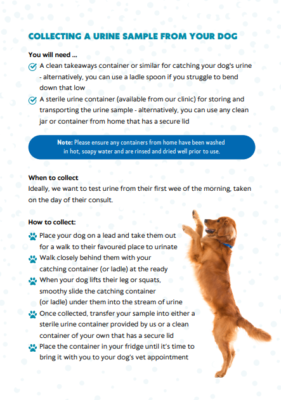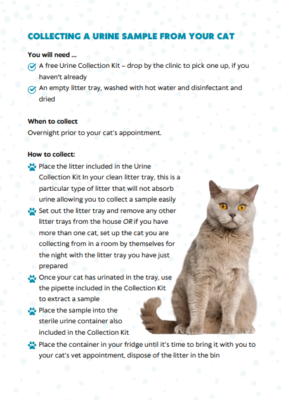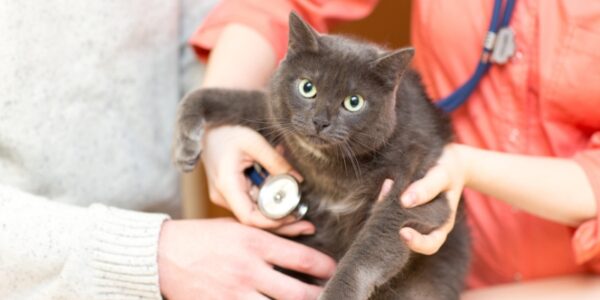Did you know that dogs and cats can get diabetes too?
Diabetes is a condition that occurs when the body can not produce enough insulin to transfer sugar from the bloodstream to the cells for energy. It can occur in dogs and cats of any age but is more common in older pets.
Recently, our vet team have noticed an influx of severe diabetes cases amongst pets aged seven years plus in the community. Diabetic pets can lead long and happy lives, but it is essential that the condition is caught early so that lifelong monitoring, treatment and diet management can be put in place.
To help ensure as many pets are diagnosed as early as possible, we are offering a free Diabetes Screening Test for cats and dogs aged 7+ when you book a consultation during September.
Claiming your free test
How to claim your free Diabetes Screening Test, valued at $75.
- Book an appointment for a routine consultation with one of our vets by calling (03) 9857 8100 or visiting vetsonbalwyn.com.au/book-online.
- A day or two before your appointment, come into the clinic to pick up a free Urine Collection Kit
- Collect a sample of your pet’s urine – your kit will have detailed instructions on how to do this and you can call us for advice if you need to
- Bring the sample of your pet’s urine in with you to the consultation and give it to the vet
- Our lab will run a series of tests on the sample to determine if there are any signs of diabetes or related metabolic health conditions
This offer ends on 30 September 2022 – book now to ensure you don’t miss out!
Terms & Conditions
- Free Diabetes Screening Test is only available as part of a paid veterinary consultation
- Only cats and dogs aged seven years of age and over are eligible for a free Diabetes Screening Test
- Urine sample must be collected prior to your appointment and presented at the time of the consultation
- Further urine or blood tests may be recommended and are not included as part of this promotion
Case Study: Sigmund Has Diabetes
Over a weekend in June, Sigmund the corgi suddenly started drinking copious amounts of water and urinating far more than what would be considered normal. He had also been very hungry over the past month (more than his usual self!) so a veterinary examination and some tests were in order.
A simple blood test was performed and it indicated that Sigmund had high blood glucose (blood sugar levels). A urine test also confirmed the presence of glucose in his urine. A diagnosis of diabetes mellitus was made.
 Diabetes is an endocrine disease where the body fails to produce enough insulin to help move sugar from the bloodstream into the cells for energy. It is similar to type 1 diabetes in humans and patients generally require the administration of insulin once or twice daily.
Diabetes is an endocrine disease where the body fails to produce enough insulin to help move sugar from the bloodstream into the cells for energy. It is similar to type 1 diabetes in humans and patients generally require the administration of insulin once or twice daily.
Learning how to check for the early indicators of diabetes is one of the most important duties in taking care of your pet. The main warning signs to watch out for are an increased appetite, excessive water drinking, weight loss (despite eating more) and increased urination.
If you notice any of these signs, you should book an appointment with one of our vets as soon as possible. The earlier the diagnosis, the better chance your pet may have for a longer and healthier life.
Management of diabetes is lifelong and involves regular blood tests, strict diet management and monitoring. Dogs usually require insulin treatment for life whereas cats may go into remission. This is because the type of diabetes cats are prone to more closely resembles ‘type 2’ diabetes in humans. Some patients do not respond as we would expect so further investigation into other diseases sometimes needs to be considered.
We are happy to report that Sigmund is responding well to treatment. He will require regular blood glucose curves in hospital over the next few months until he is stabilised on an ideal dose of insulin.
If you notice any changes to your pet’s daily habits such as a change in appetite or thirst, it’s a good idea to arrange a consultation with us as soon as possible as there are many endocrine diseases that can present with similar signs. Early diagnosis and treatment can help prevent secondary complications that can in some cases be life-threatening.
The four main diabetes signs to watch out for:
About Urine Testing
You might laugh at us but we love wee! Just a small amount of your pet’s urine provides us with valuable information about their internal health and can also help rule out diseases such as diabetes and kidney insufficiency.
A urine dipstick allows us to look for the presence of blood, protein and glucose. It can also confirm the presence of ketones, a potentially life-threatening condition that can occur when the body can no longer cope with diabetes.
Urine-specific gravity or ‘USG’ helps us to determine how well the kidneys are working by measuring how effectively they are concentrating the urine. This is especially important when we are on the hunt for kidney disease, as sometimes a change in USG can be an early indication of disease. This early stage of kidney disease may not be detectable with a routine blood test.
In some cases, it may be necessary to examine the sediment of the urine under a microscope to look for bacteria or particular cells that may indicate disease. Cancer cells can be evident on a sediment exam as can crystals that can be a telltale sign of other urinary tract diseases.
Collecting a sample
If you have a dog, collecting a urine sample is usually a matter of waiting until they go to urinate, and then catching a sample in the provided container.
Cats, as you would expect, can be trickier. Included in your Urine Collection Kit is special litter that does not absorb urine and will allow you to more easily collect a sample from your pet’s litter tray – just follow the instructions provided.
Download one of our free step-by-step guides on how to easily collect a urine sample from your cat or dog.
If you have any questions about collecting a urine sample, please do not hesitate to contact us on (03) 9857 8100.







